Auckland International Campus: AM807001 Tohu Wines Case Study Analysis
VerifiedAdded on 2022/11/17
|23
|5149
|272
Case Study
AI Summary
This case study examines Tohu Wines, a Maori winery operating under the Wakatu Corporation, focusing on its entrepreneurial strategies and challenges. The analysis begins with an executive summary and introduction, followed by a literature review that explores the company's strategic issues. The study applies the 7S model and PESTLE analysis to evaluate Tohu's current business activities, vision, and goals. Key strategic issues are identified, including upholding Maori foundation culture, expansion and branding, and labor-intensive production methods. The report then proposes solutions and recommendations to address these issues, concluding with a summary of findings and a list of references. The assignment aims to provide an in-depth understanding of Tohu Wines' operational strategies and challenges, offering insights into potential improvements and future growth opportunities within the wine industry.

Running head
Name:
Title:
Institution:
Name:
Title:
Institution:
Paraphrase This Document
Need a fresh take? Get an instant paraphrase of this document with our AI Paraphraser
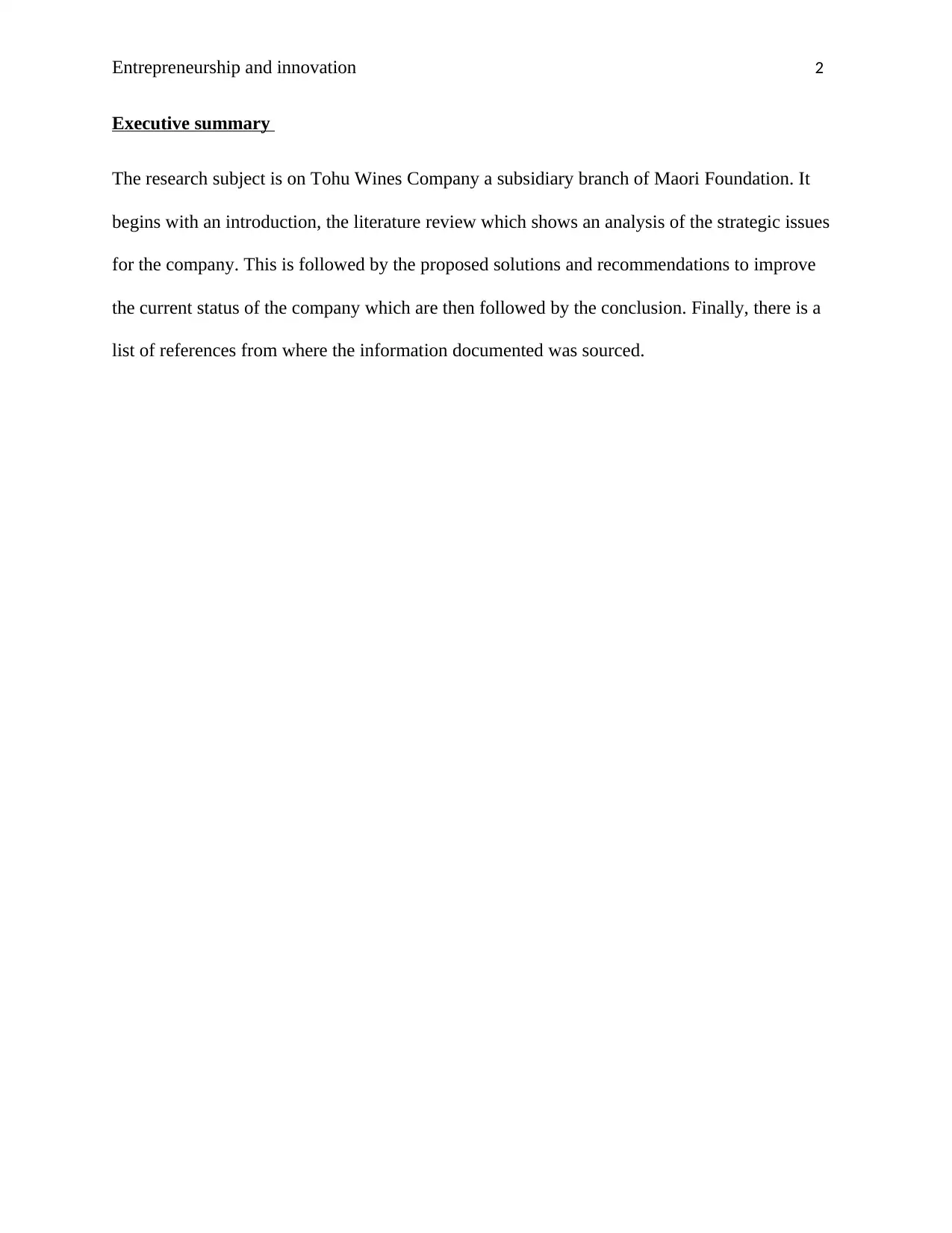
Entrepreneurship and innovation 2
Executive summary
The research subject is on Tohu Wines Company a subsidiary branch of Maori Foundation. It
begins with an introduction, the literature review which shows an analysis of the strategic issues
for the company. This is followed by the proposed solutions and recommendations to improve
the current status of the company which are then followed by the conclusion. Finally, there is a
list of references from where the information documented was sourced.
Executive summary
The research subject is on Tohu Wines Company a subsidiary branch of Maori Foundation. It
begins with an introduction, the literature review which shows an analysis of the strategic issues
for the company. This is followed by the proposed solutions and recommendations to improve
the current status of the company which are then followed by the conclusion. Finally, there is a
list of references from where the information documented was sourced.
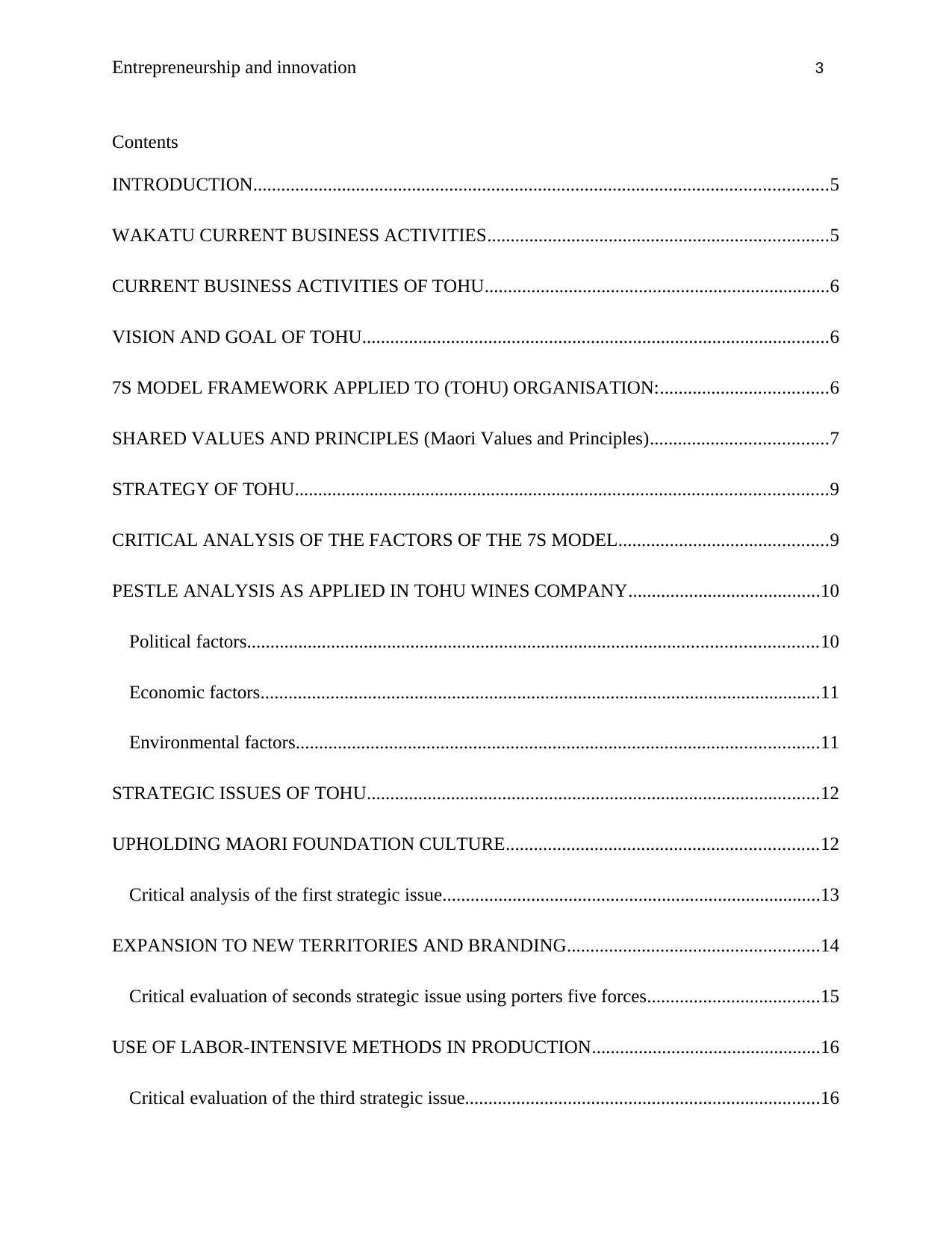
Entrepreneurship and innovation 3
Contents
INTRODUCTION...........................................................................................................................5
WAKATU CURRENT BUSINESS ACTIVITIES.........................................................................5
CURRENT BUSINESS ACTIVITIES OF TOHU..........................................................................6
VISION AND GOAL OF TOHU....................................................................................................6
7S MODEL FRAMEWORK APPLIED TO (TOHU) ORGANISATION:....................................6
SHARED VALUES AND PRINCIPLES (Maori Values and Principles)......................................7
STRATEGY OF TOHU..................................................................................................................9
CRITICAL ANALYSIS OF THE FACTORS OF THE 7S MODEL.............................................9
PESTLE ANALYSIS AS APPLIED IN TOHU WINES COMPANY.........................................10
Political factors..........................................................................................................................10
Economic factors........................................................................................................................11
Environmental factors................................................................................................................11
STRATEGIC ISSUES OF TOHU.................................................................................................12
UPHOLDING MAORI FOUNDATION CULTURE...................................................................12
Critical analysis of the first strategic issue.................................................................................13
EXPANSION TO NEW TERRITORIES AND BRANDING......................................................14
Critical evaluation of seconds strategic issue using porters five forces.....................................15
USE OF LABOR-INTENSIVE METHODS IN PRODUCTION.................................................16
Critical evaluation of the third strategic issue............................................................................16
Contents
INTRODUCTION...........................................................................................................................5
WAKATU CURRENT BUSINESS ACTIVITIES.........................................................................5
CURRENT BUSINESS ACTIVITIES OF TOHU..........................................................................6
VISION AND GOAL OF TOHU....................................................................................................6
7S MODEL FRAMEWORK APPLIED TO (TOHU) ORGANISATION:....................................6
SHARED VALUES AND PRINCIPLES (Maori Values and Principles)......................................7
STRATEGY OF TOHU..................................................................................................................9
CRITICAL ANALYSIS OF THE FACTORS OF THE 7S MODEL.............................................9
PESTLE ANALYSIS AS APPLIED IN TOHU WINES COMPANY.........................................10
Political factors..........................................................................................................................10
Economic factors........................................................................................................................11
Environmental factors................................................................................................................11
STRATEGIC ISSUES OF TOHU.................................................................................................12
UPHOLDING MAORI FOUNDATION CULTURE...................................................................12
Critical analysis of the first strategic issue.................................................................................13
EXPANSION TO NEW TERRITORIES AND BRANDING......................................................14
Critical evaluation of seconds strategic issue using porters five forces.....................................15
USE OF LABOR-INTENSIVE METHODS IN PRODUCTION.................................................16
Critical evaluation of the third strategic issue............................................................................16
⊘ This is a preview!⊘
Do you want full access?
Subscribe today to unlock all pages.

Trusted by 1+ million students worldwide
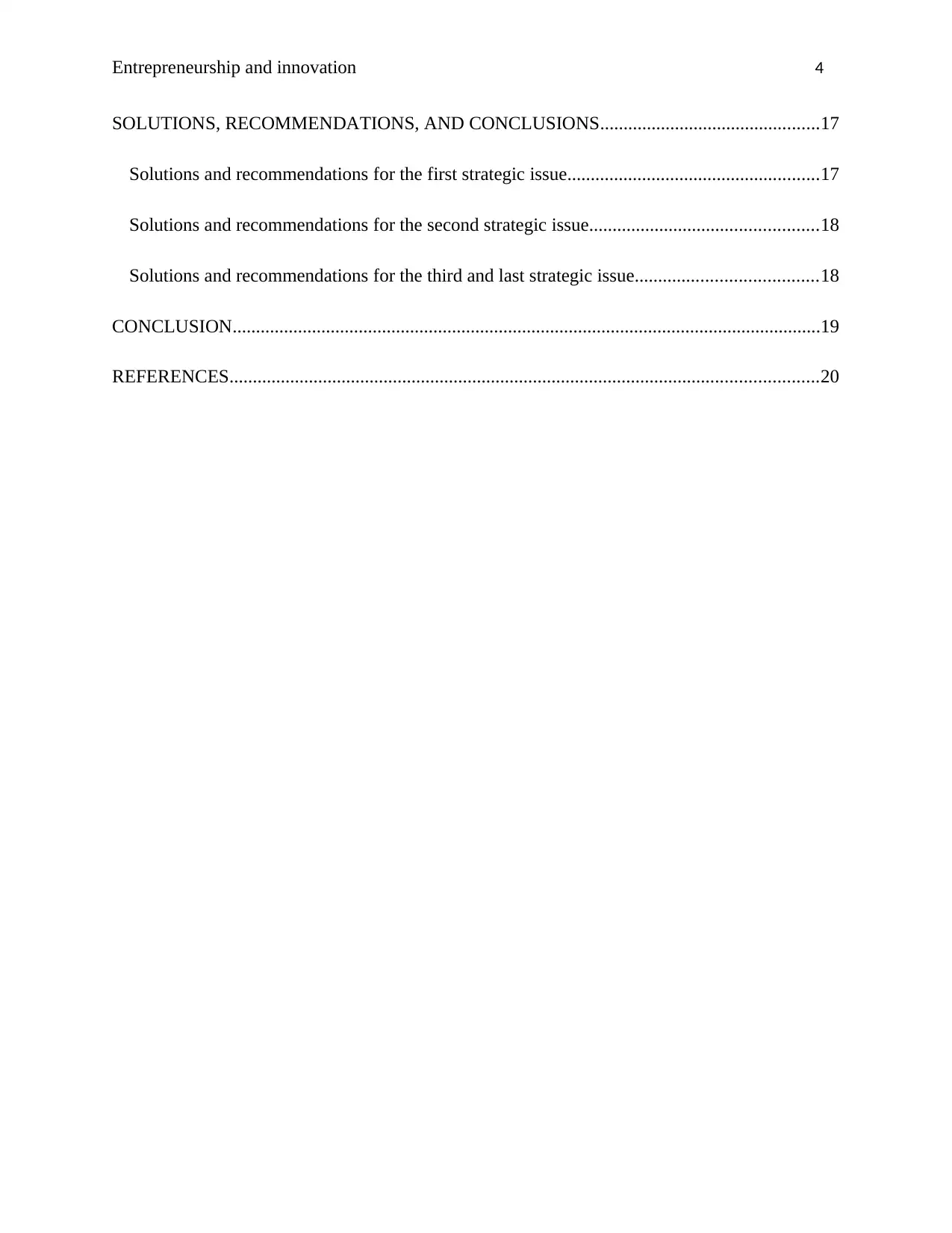
Entrepreneurship and innovation 4
SOLUTIONS, RECOMMENDATIONS, AND CONCLUSIONS...............................................17
Solutions and recommendations for the first strategic issue......................................................17
Solutions and recommendations for the second strategic issue.................................................18
Solutions and recommendations for the third and last strategic issue.......................................18
CONCLUSION..............................................................................................................................19
REFERENCES..............................................................................................................................20
SOLUTIONS, RECOMMENDATIONS, AND CONCLUSIONS...............................................17
Solutions and recommendations for the first strategic issue......................................................17
Solutions and recommendations for the second strategic issue.................................................18
Solutions and recommendations for the third and last strategic issue.......................................18
CONCLUSION..............................................................................................................................19
REFERENCES..............................................................................................................................20
Paraphrase This Document
Need a fresh take? Get an instant paraphrase of this document with our AI Paraphraser
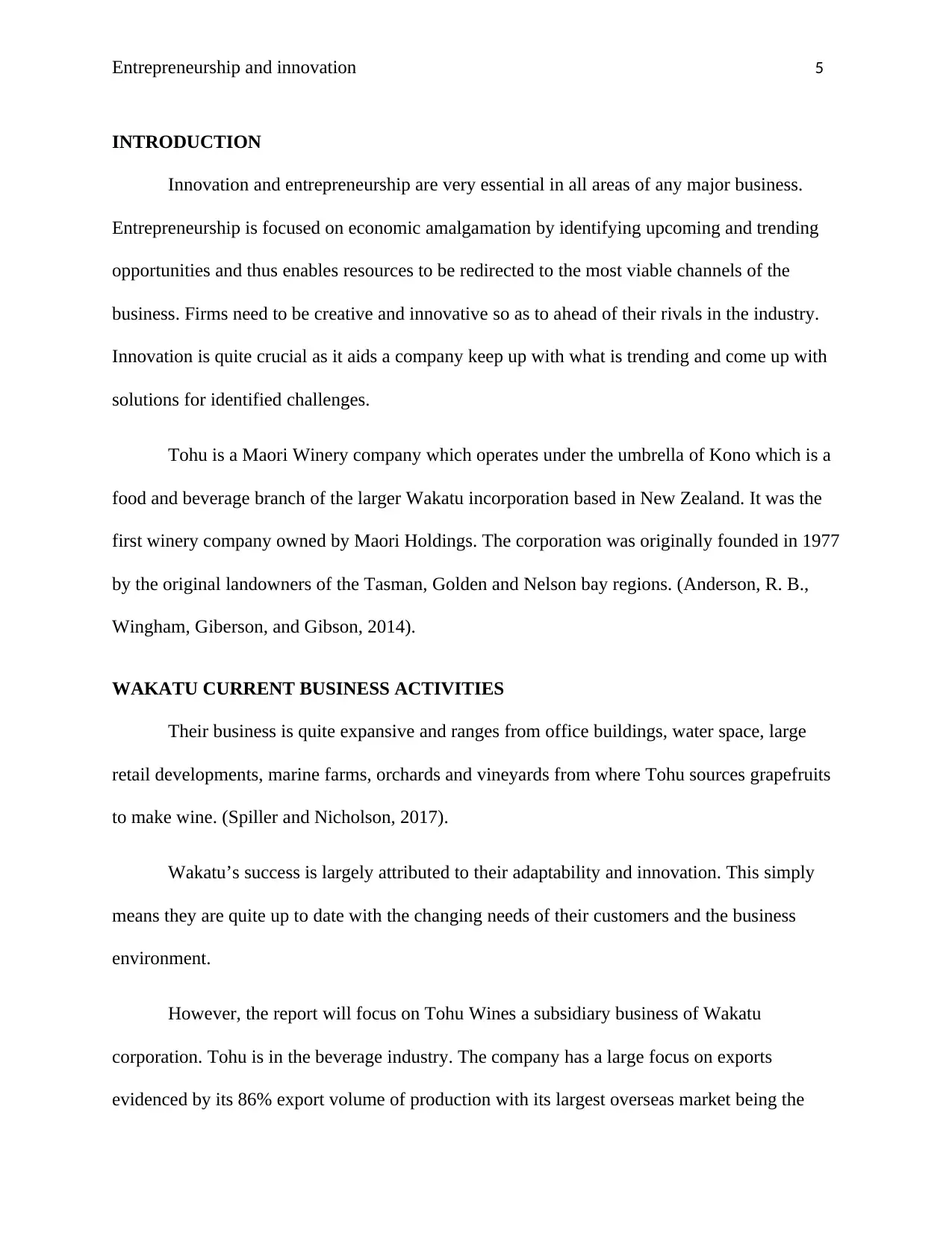
Entrepreneurship and innovation 5
INTRODUCTION
Innovation and entrepreneurship are very essential in all areas of any major business.
Entrepreneurship is focused on economic amalgamation by identifying upcoming and trending
opportunities and thus enables resources to be redirected to the most viable channels of the
business. Firms need to be creative and innovative so as to ahead of their rivals in the industry.
Innovation is quite crucial as it aids a company keep up with what is trending and come up with
solutions for identified challenges.
Tohu is a Maori Winery company which operates under the umbrella of Kono which is a
food and beverage branch of the larger Wakatu incorporation based in New Zealand. It was the
first winery company owned by Maori Holdings. The corporation was originally founded in 1977
by the original landowners of the Tasman, Golden and Nelson bay regions. (Anderson, R. B.,
Wingham, Giberson, and Gibson, 2014).
WAKATU CURRENT BUSINESS ACTIVITIES
Their business is quite expansive and ranges from office buildings, water space, large
retail developments, marine farms, orchards and vineyards from where Tohu sources grapefruits
to make wine. (Spiller and Nicholson, 2017).
Wakatu’s success is largely attributed to their adaptability and innovation. This simply
means they are quite up to date with the changing needs of their customers and the business
environment.
However, the report will focus on Tohu Wines a subsidiary business of Wakatu
corporation. Tohu is in the beverage industry. The company has a large focus on exports
evidenced by its 86% export volume of production with its largest overseas market being the
INTRODUCTION
Innovation and entrepreneurship are very essential in all areas of any major business.
Entrepreneurship is focused on economic amalgamation by identifying upcoming and trending
opportunities and thus enables resources to be redirected to the most viable channels of the
business. Firms need to be creative and innovative so as to ahead of their rivals in the industry.
Innovation is quite crucial as it aids a company keep up with what is trending and come up with
solutions for identified challenges.
Tohu is a Maori Winery company which operates under the umbrella of Kono which is a
food and beverage branch of the larger Wakatu incorporation based in New Zealand. It was the
first winery company owned by Maori Holdings. The corporation was originally founded in 1977
by the original landowners of the Tasman, Golden and Nelson bay regions. (Anderson, R. B.,
Wingham, Giberson, and Gibson, 2014).
WAKATU CURRENT BUSINESS ACTIVITIES
Their business is quite expansive and ranges from office buildings, water space, large
retail developments, marine farms, orchards and vineyards from where Tohu sources grapefruits
to make wine. (Spiller and Nicholson, 2017).
Wakatu’s success is largely attributed to their adaptability and innovation. This simply
means they are quite up to date with the changing needs of their customers and the business
environment.
However, the report will focus on Tohu Wines a subsidiary business of Wakatu
corporation. Tohu is in the beverage industry. The company has a large focus on exports
evidenced by its 86% export volume of production with its largest overseas market being the
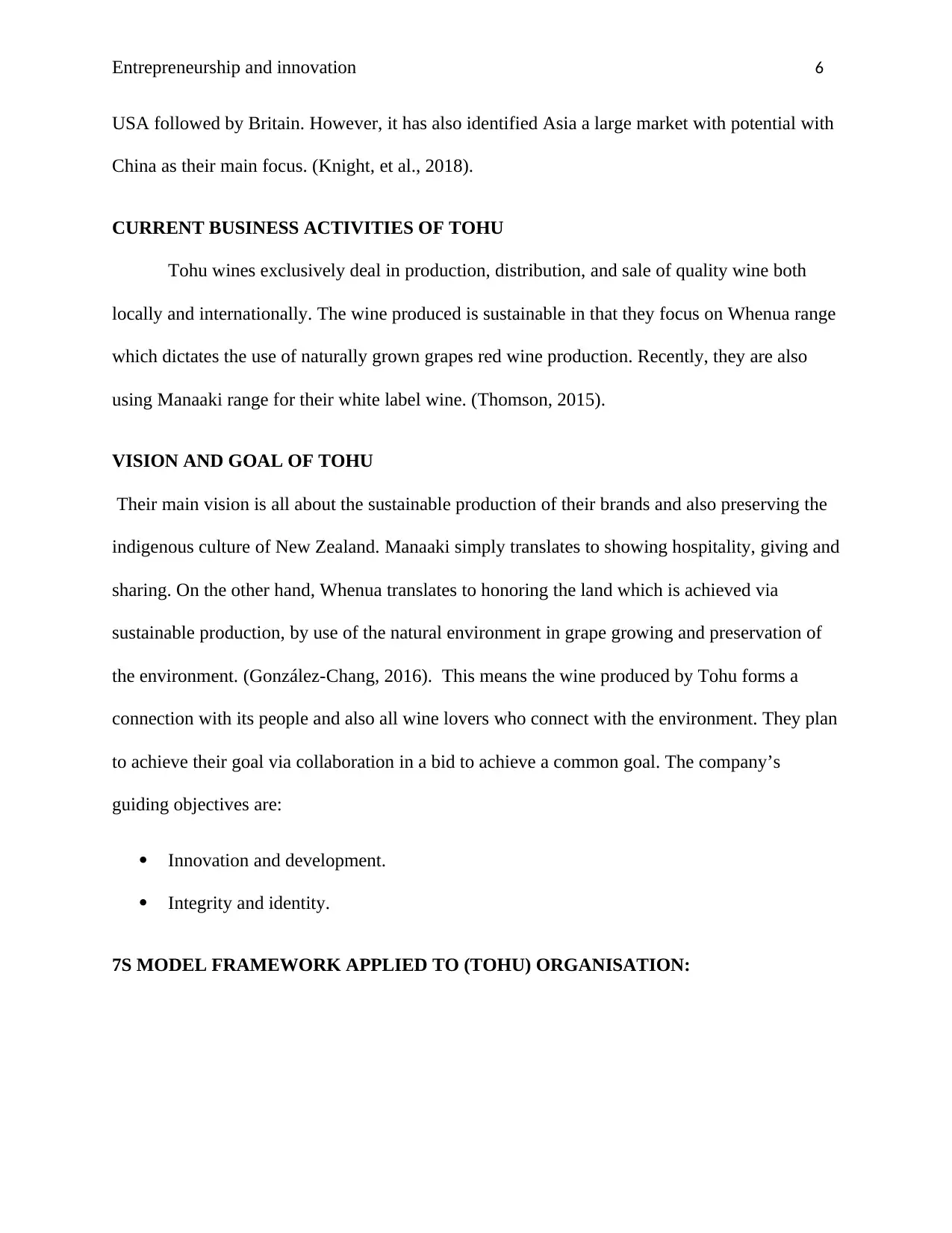
Entrepreneurship and innovation 6
USA followed by Britain. However, it has also identified Asia a large market with potential with
China as their main focus. (Knight, et al., 2018).
CURRENT BUSINESS ACTIVITIES OF TOHU
Tohu wines exclusively deal in production, distribution, and sale of quality wine both
locally and internationally. The wine produced is sustainable in that they focus on Whenua range
which dictates the use of naturally grown grapes red wine production. Recently, they are also
using Manaaki range for their white label wine. (Thomson, 2015).
VISION AND GOAL OF TOHU
Their main vision is all about the sustainable production of their brands and also preserving the
indigenous culture of New Zealand. Manaaki simply translates to showing hospitality, giving and
sharing. On the other hand, Whenua translates to honoring the land which is achieved via
sustainable production, by use of the natural environment in grape growing and preservation of
the environment. (González-Chang, 2016). This means the wine produced by Tohu forms a
connection with its people and also all wine lovers who connect with the environment. They plan
to achieve their goal via collaboration in a bid to achieve a common goal. The company’s
guiding objectives are:
Innovation and development.
Integrity and identity.
7S MODEL FRAMEWORK APPLIED TO (TOHU) ORGANISATION:
USA followed by Britain. However, it has also identified Asia a large market with potential with
China as their main focus. (Knight, et al., 2018).
CURRENT BUSINESS ACTIVITIES OF TOHU
Tohu wines exclusively deal in production, distribution, and sale of quality wine both
locally and internationally. The wine produced is sustainable in that they focus on Whenua range
which dictates the use of naturally grown grapes red wine production. Recently, they are also
using Manaaki range for their white label wine. (Thomson, 2015).
VISION AND GOAL OF TOHU
Their main vision is all about the sustainable production of their brands and also preserving the
indigenous culture of New Zealand. Manaaki simply translates to showing hospitality, giving and
sharing. On the other hand, Whenua translates to honoring the land which is achieved via
sustainable production, by use of the natural environment in grape growing and preservation of
the environment. (González-Chang, 2016). This means the wine produced by Tohu forms a
connection with its people and also all wine lovers who connect with the environment. They plan
to achieve their goal via collaboration in a bid to achieve a common goal. The company’s
guiding objectives are:
Innovation and development.
Integrity and identity.
7S MODEL FRAMEWORK APPLIED TO (TOHU) ORGANISATION:
⊘ This is a preview!⊘
Do you want full access?
Subscribe today to unlock all pages.

Trusted by 1+ million students worldwide
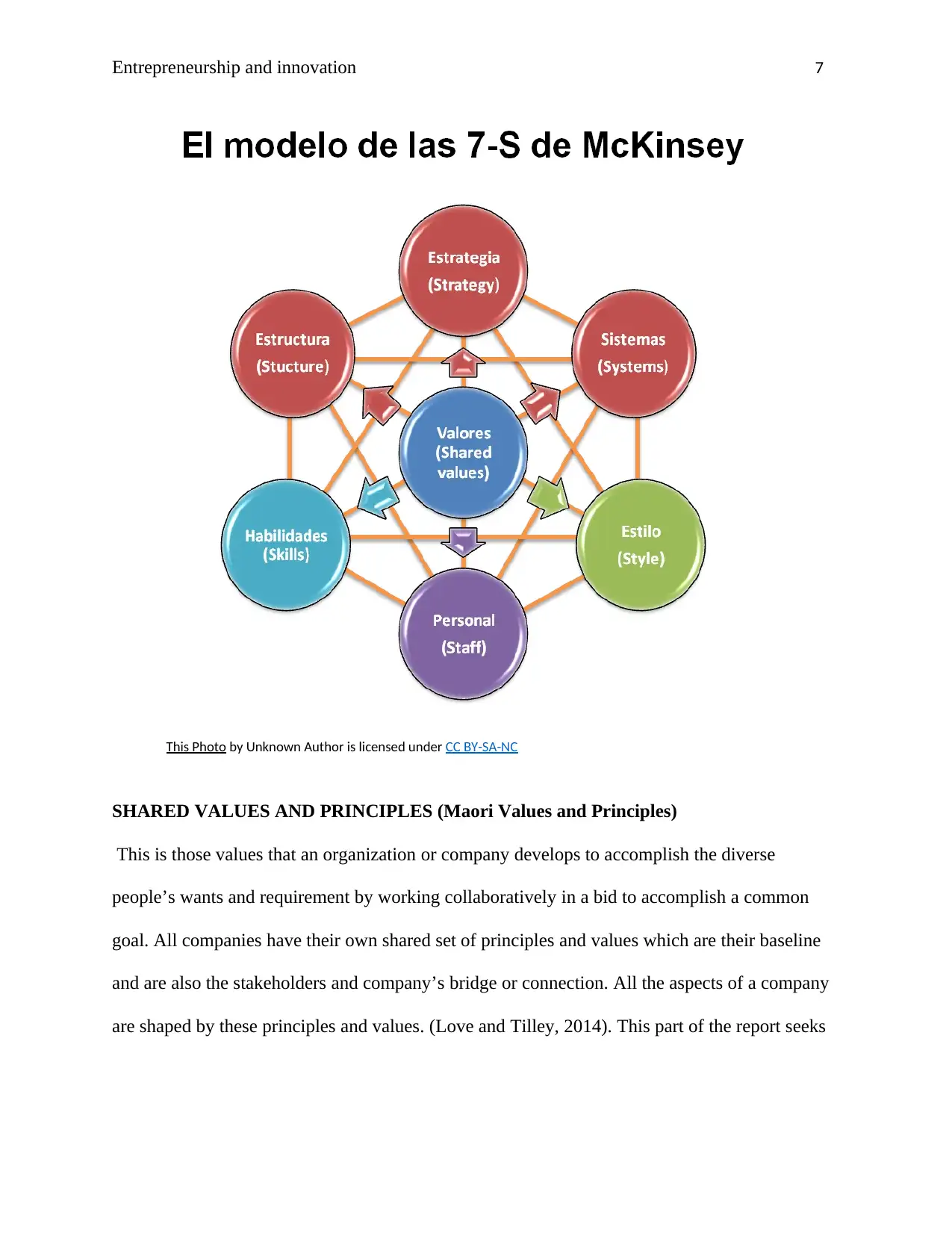
Entrepreneurship and innovation 7
SHARED VALUES AND PRINCIPLES (Maori Values and Principles)
This is those values that an organization or company develops to accomplish the diverse
people’s wants and requirement by working collaboratively in a bid to accomplish a common
goal. All companies have their own shared set of principles and values which are their baseline
and are also the stakeholders and company’s bridge or connection. All the aspects of a company
are shaped by these principles and values. (Love and Tilley, 2014). This part of the report seeks
This Photo by Unknown Author is licensed under CC BY-SA-NC
SHARED VALUES AND PRINCIPLES (Maori Values and Principles)
This is those values that an organization or company develops to accomplish the diverse
people’s wants and requirement by working collaboratively in a bid to accomplish a common
goal. All companies have their own shared set of principles and values which are their baseline
and are also the stakeholders and company’s bridge or connection. All the aspects of a company
are shaped by these principles and values. (Love and Tilley, 2014). This part of the report seeks
This Photo by Unknown Author is licensed under CC BY-SA-NC
Paraphrase This Document
Need a fresh take? Get an instant paraphrase of this document with our AI Paraphraser
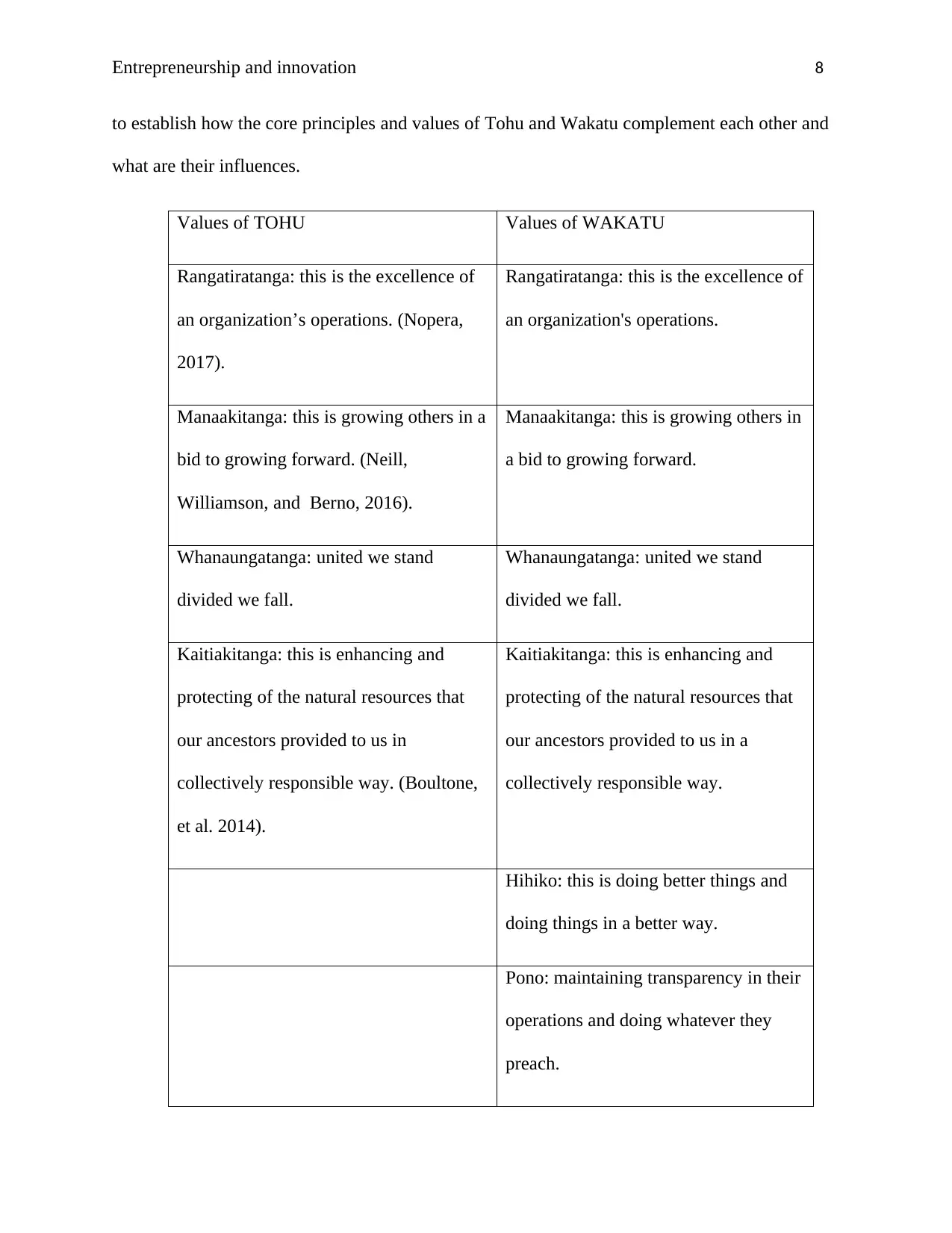
Entrepreneurship and innovation 8
to establish how the core principles and values of Tohu and Wakatu complement each other and
what are their influences.
Values of TOHU Values of WAKATU
Rangatiratanga: this is the excellence of
an organization’s operations. (Nopera,
2017).
Rangatiratanga: this is the excellence of
an organization's operations.
Manaakitanga: this is growing others in a
bid to growing forward. (Neill,
Williamson, and Berno, 2016).
Manaakitanga: this is growing others in
a bid to growing forward.
Whanaungatanga: united we stand
divided we fall.
Whanaungatanga: united we stand
divided we fall.
Kaitiakitanga: this is enhancing and
protecting of the natural resources that
our ancestors provided to us in
collectively responsible way. (Boultone,
et al. 2014).
Kaitiakitanga: this is enhancing and
protecting of the natural resources that
our ancestors provided to us in a
collectively responsible way.
Hihiko: this is doing better things and
doing things in a better way.
Pono: maintaining transparency in their
operations and doing whatever they
preach.
to establish how the core principles and values of Tohu and Wakatu complement each other and
what are their influences.
Values of TOHU Values of WAKATU
Rangatiratanga: this is the excellence of
an organization’s operations. (Nopera,
2017).
Rangatiratanga: this is the excellence of
an organization's operations.
Manaakitanga: this is growing others in a
bid to growing forward. (Neill,
Williamson, and Berno, 2016).
Manaakitanga: this is growing others in
a bid to growing forward.
Whanaungatanga: united we stand
divided we fall.
Whanaungatanga: united we stand
divided we fall.
Kaitiakitanga: this is enhancing and
protecting of the natural resources that
our ancestors provided to us in
collectively responsible way. (Boultone,
et al. 2014).
Kaitiakitanga: this is enhancing and
protecting of the natural resources that
our ancestors provided to us in a
collectively responsible way.
Hihiko: this is doing better things and
doing things in a better way.
Pono: maintaining transparency in their
operations and doing whatever they
preach.
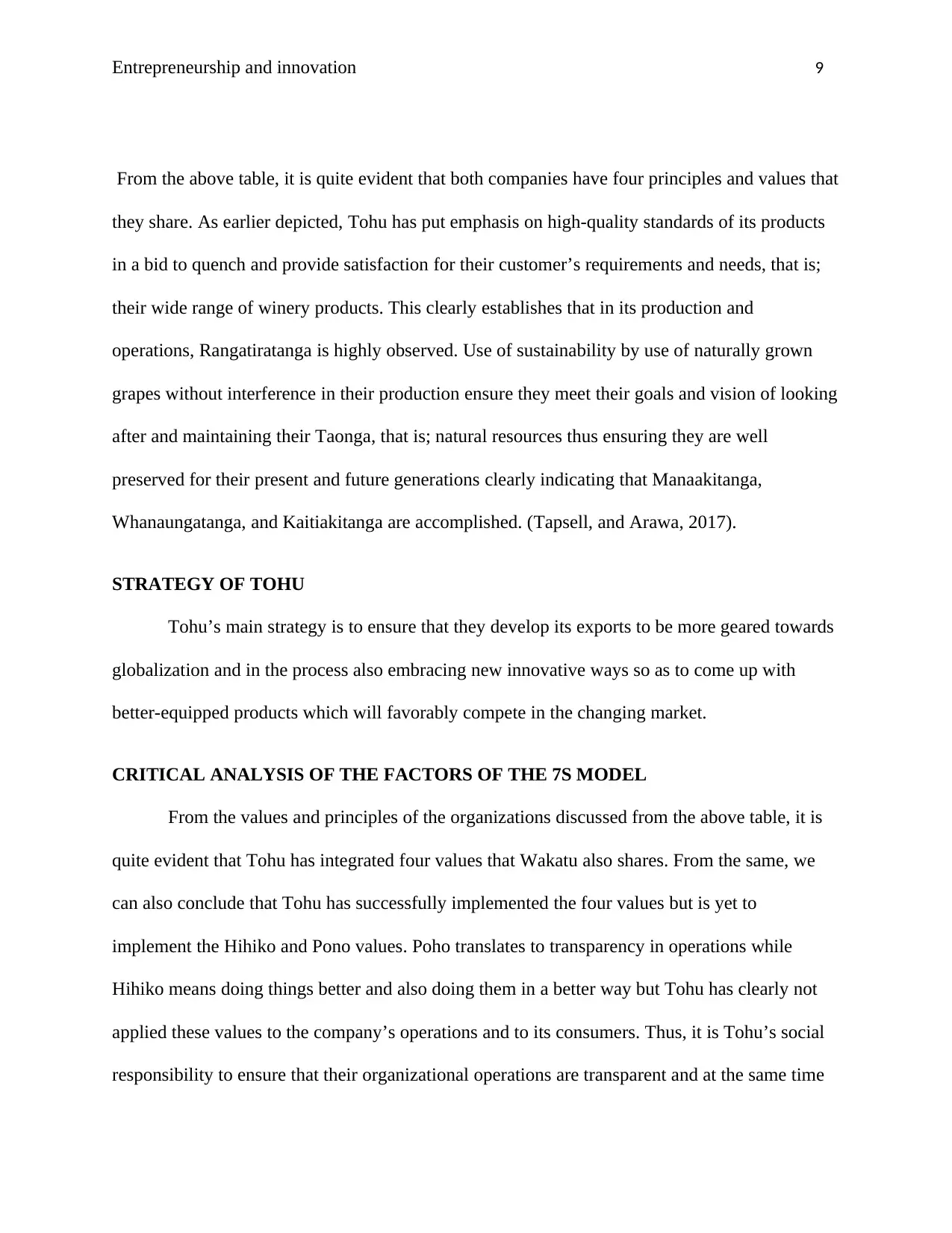
Entrepreneurship and innovation 9
From the above table, it is quite evident that both companies have four principles and values that
they share. As earlier depicted, Tohu has put emphasis on high-quality standards of its products
in a bid to quench and provide satisfaction for their customer’s requirements and needs, that is;
their wide range of winery products. This clearly establishes that in its production and
operations, Rangatiratanga is highly observed. Use of sustainability by use of naturally grown
grapes without interference in their production ensure they meet their goals and vision of looking
after and maintaining their Taonga, that is; natural resources thus ensuring they are well
preserved for their present and future generations clearly indicating that Manaakitanga,
Whanaungatanga, and Kaitiakitanga are accomplished. (Tapsell, and Arawa, 2017).
STRATEGY OF TOHU
Tohu’s main strategy is to ensure that they develop its exports to be more geared towards
globalization and in the process also embracing new innovative ways so as to come up with
better-equipped products which will favorably compete in the changing market.
CRITICAL ANALYSIS OF THE FACTORS OF THE 7S MODEL
From the values and principles of the organizations discussed from the above table, it is
quite evident that Tohu has integrated four values that Wakatu also shares. From the same, we
can also conclude that Tohu has successfully implemented the four values but is yet to
implement the Hihiko and Pono values. Poho translates to transparency in operations while
Hihiko means doing things better and also doing them in a better way but Tohu has clearly not
applied these values to the company’s operations and to its consumers. Thus, it is Tohu’s social
responsibility to ensure that their organizational operations are transparent and at the same time
From the above table, it is quite evident that both companies have four principles and values that
they share. As earlier depicted, Tohu has put emphasis on high-quality standards of its products
in a bid to quench and provide satisfaction for their customer’s requirements and needs, that is;
their wide range of winery products. This clearly establishes that in its production and
operations, Rangatiratanga is highly observed. Use of sustainability by use of naturally grown
grapes without interference in their production ensure they meet their goals and vision of looking
after and maintaining their Taonga, that is; natural resources thus ensuring they are well
preserved for their present and future generations clearly indicating that Manaakitanga,
Whanaungatanga, and Kaitiakitanga are accomplished. (Tapsell, and Arawa, 2017).
STRATEGY OF TOHU
Tohu’s main strategy is to ensure that they develop its exports to be more geared towards
globalization and in the process also embracing new innovative ways so as to come up with
better-equipped products which will favorably compete in the changing market.
CRITICAL ANALYSIS OF THE FACTORS OF THE 7S MODEL
From the values and principles of the organizations discussed from the above table, it is
quite evident that Tohu has integrated four values that Wakatu also shares. From the same, we
can also conclude that Tohu has successfully implemented the four values but is yet to
implement the Hihiko and Pono values. Poho translates to transparency in operations while
Hihiko means doing things better and also doing them in a better way but Tohu has clearly not
applied these values to the company’s operations and to its consumers. Thus, it is Tohu’s social
responsibility to ensure that their organizational operations are transparent and at the same time
⊘ This is a preview!⊘
Do you want full access?
Subscribe today to unlock all pages.

Trusted by 1+ million students worldwide
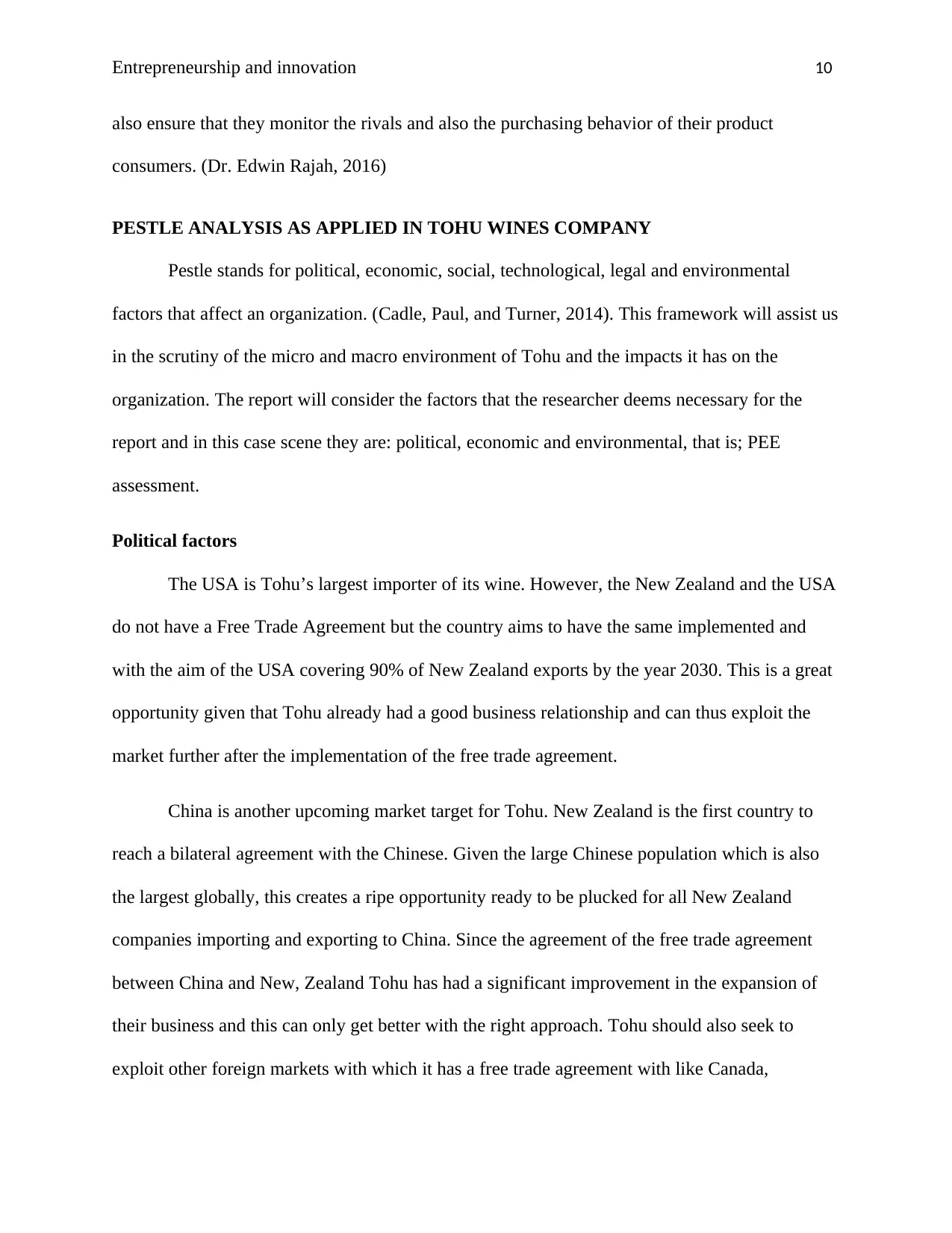
Entrepreneurship and innovation 10
also ensure that they monitor the rivals and also the purchasing behavior of their product
consumers. (Dr. Edwin Rajah, 2016)
PESTLE ANALYSIS AS APPLIED IN TOHU WINES COMPANY
Pestle stands for political, economic, social, technological, legal and environmental
factors that affect an organization. (Cadle, Paul, and Turner, 2014). This framework will assist us
in the scrutiny of the micro and macro environment of Tohu and the impacts it has on the
organization. The report will consider the factors that the researcher deems necessary for the
report and in this case scene they are: political, economic and environmental, that is; PEE
assessment.
Political factors
The USA is Tohu’s largest importer of its wine. However, the New Zealand and the USA
do not have a Free Trade Agreement but the country aims to have the same implemented and
with the aim of the USA covering 90% of New Zealand exports by the year 2030. This is a great
opportunity given that Tohu already had a good business relationship and can thus exploit the
market further after the implementation of the free trade agreement.
China is another upcoming market target for Tohu. New Zealand is the first country to
reach a bilateral agreement with the Chinese. Given the large Chinese population which is also
the largest globally, this creates a ripe opportunity ready to be plucked for all New Zealand
companies importing and exporting to China. Since the agreement of the free trade agreement
between China and New, Zealand Tohu has had a significant improvement in the expansion of
their business and this can only get better with the right approach. Tohu should also seek to
exploit other foreign markets with which it has a free trade agreement with like Canada,
also ensure that they monitor the rivals and also the purchasing behavior of their product
consumers. (Dr. Edwin Rajah, 2016)
PESTLE ANALYSIS AS APPLIED IN TOHU WINES COMPANY
Pestle stands for political, economic, social, technological, legal and environmental
factors that affect an organization. (Cadle, Paul, and Turner, 2014). This framework will assist us
in the scrutiny of the micro and macro environment of Tohu and the impacts it has on the
organization. The report will consider the factors that the researcher deems necessary for the
report and in this case scene they are: political, economic and environmental, that is; PEE
assessment.
Political factors
The USA is Tohu’s largest importer of its wine. However, the New Zealand and the USA
do not have a Free Trade Agreement but the country aims to have the same implemented and
with the aim of the USA covering 90% of New Zealand exports by the year 2030. This is a great
opportunity given that Tohu already had a good business relationship and can thus exploit the
market further after the implementation of the free trade agreement.
China is another upcoming market target for Tohu. New Zealand is the first country to
reach a bilateral agreement with the Chinese. Given the large Chinese population which is also
the largest globally, this creates a ripe opportunity ready to be plucked for all New Zealand
companies importing and exporting to China. Since the agreement of the free trade agreement
between China and New, Zealand Tohu has had a significant improvement in the expansion of
their business and this can only get better with the right approach. Tohu should also seek to
exploit other foreign markets with which it has a free trade agreement with like Canada,
Paraphrase This Document
Need a fresh take? Get an instant paraphrase of this document with our AI Paraphraser
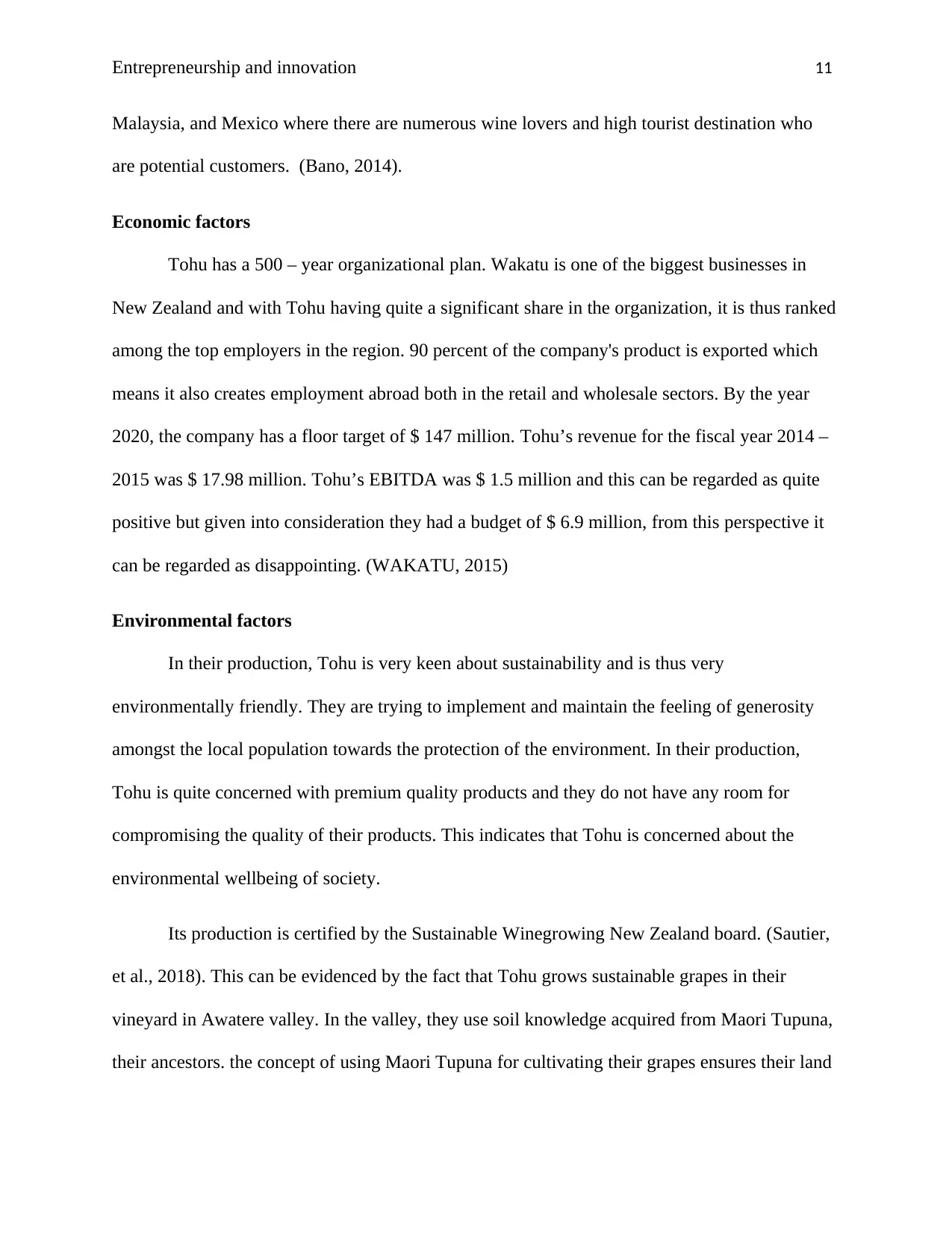
Entrepreneurship and innovation 11
Malaysia, and Mexico where there are numerous wine lovers and high tourist destination who
are potential customers. (Bano, 2014).
Economic factors
Tohu has a 500 – year organizational plan. Wakatu is one of the biggest businesses in
New Zealand and with Tohu having quite a significant share in the organization, it is thus ranked
among the top employers in the region. 90 percent of the company's product is exported which
means it also creates employment abroad both in the retail and wholesale sectors. By the year
2020, the company has a floor target of $ 147 million. Tohu’s revenue for the fiscal year 2014 –
2015 was $ 17.98 million. Tohu’s EBITDA was $ 1.5 million and this can be regarded as quite
positive but given into consideration they had a budget of $ 6.9 million, from this perspective it
can be regarded as disappointing. (WAKATU, 2015)
Environmental factors
In their production, Tohu is very keen about sustainability and is thus very
environmentally friendly. They are trying to implement and maintain the feeling of generosity
amongst the local population towards the protection of the environment. In their production,
Tohu is quite concerned with premium quality products and they do not have any room for
compromising the quality of their products. This indicates that Tohu is concerned about the
environmental wellbeing of society.
Its production is certified by the Sustainable Winegrowing New Zealand board. (Sautier,
et al., 2018). This can be evidenced by the fact that Tohu grows sustainable grapes in their
vineyard in Awatere valley. In the valley, they use soil knowledge acquired from Maori Tupuna,
their ancestors. the concept of using Maori Tupuna for cultivating their grapes ensures their land
Malaysia, and Mexico where there are numerous wine lovers and high tourist destination who
are potential customers. (Bano, 2014).
Economic factors
Tohu has a 500 – year organizational plan. Wakatu is one of the biggest businesses in
New Zealand and with Tohu having quite a significant share in the organization, it is thus ranked
among the top employers in the region. 90 percent of the company's product is exported which
means it also creates employment abroad both in the retail and wholesale sectors. By the year
2020, the company has a floor target of $ 147 million. Tohu’s revenue for the fiscal year 2014 –
2015 was $ 17.98 million. Tohu’s EBITDA was $ 1.5 million and this can be regarded as quite
positive but given into consideration they had a budget of $ 6.9 million, from this perspective it
can be regarded as disappointing. (WAKATU, 2015)
Environmental factors
In their production, Tohu is very keen about sustainability and is thus very
environmentally friendly. They are trying to implement and maintain the feeling of generosity
amongst the local population towards the protection of the environment. In their production,
Tohu is quite concerned with premium quality products and they do not have any room for
compromising the quality of their products. This indicates that Tohu is concerned about the
environmental wellbeing of society.
Its production is certified by the Sustainable Winegrowing New Zealand board. (Sautier,
et al., 2018). This can be evidenced by the fact that Tohu grows sustainable grapes in their
vineyard in Awatere valley. In the valley, they use soil knowledge acquired from Maori Tupuna,
their ancestors. the concept of using Maori Tupuna for cultivating their grapes ensures their land
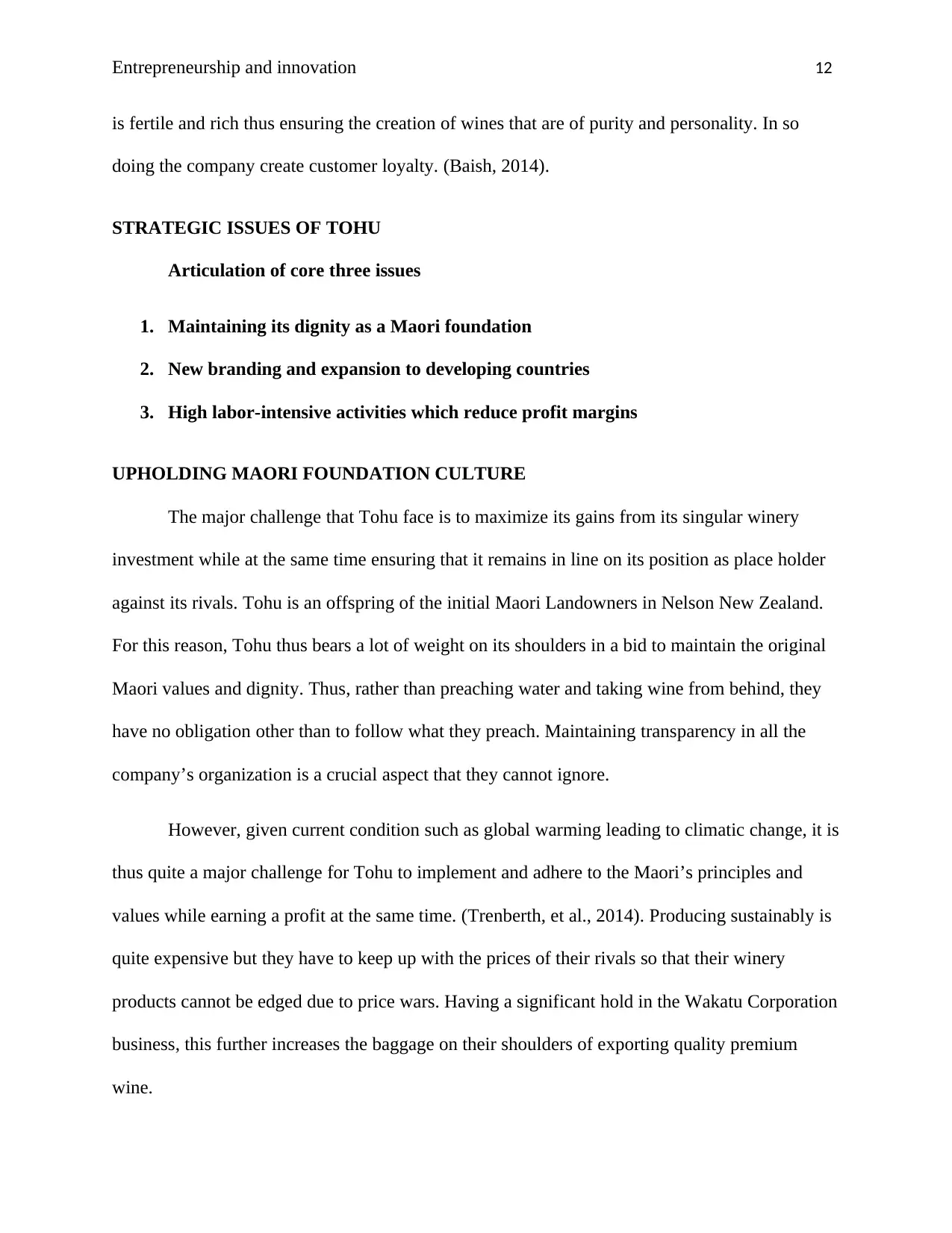
Entrepreneurship and innovation 12
is fertile and rich thus ensuring the creation of wines that are of purity and personality. In so
doing the company create customer loyalty. (Baish, 2014).
STRATEGIC ISSUES OF TOHU
Articulation of core three issues
1. Maintaining its dignity as a Maori foundation
2. New branding and expansion to developing countries
3. High labor-intensive activities which reduce profit margins
UPHOLDING MAORI FOUNDATION CULTURE
The major challenge that Tohu face is to maximize its gains from its singular winery
investment while at the same time ensuring that it remains in line on its position as place holder
against its rivals. Tohu is an offspring of the initial Maori Landowners in Nelson New Zealand.
For this reason, Tohu thus bears a lot of weight on its shoulders in a bid to maintain the original
Maori values and dignity. Thus, rather than preaching water and taking wine from behind, they
have no obligation other than to follow what they preach. Maintaining transparency in all the
company’s organization is a crucial aspect that they cannot ignore.
However, given current condition such as global warming leading to climatic change, it is
thus quite a major challenge for Tohu to implement and adhere to the Maori’s principles and
values while earning a profit at the same time. (Trenberth, et al., 2014). Producing sustainably is
quite expensive but they have to keep up with the prices of their rivals so that their winery
products cannot be edged due to price wars. Having a significant hold in the Wakatu Corporation
business, this further increases the baggage on their shoulders of exporting quality premium
wine.
is fertile and rich thus ensuring the creation of wines that are of purity and personality. In so
doing the company create customer loyalty. (Baish, 2014).
STRATEGIC ISSUES OF TOHU
Articulation of core three issues
1. Maintaining its dignity as a Maori foundation
2. New branding and expansion to developing countries
3. High labor-intensive activities which reduce profit margins
UPHOLDING MAORI FOUNDATION CULTURE
The major challenge that Tohu face is to maximize its gains from its singular winery
investment while at the same time ensuring that it remains in line on its position as place holder
against its rivals. Tohu is an offspring of the initial Maori Landowners in Nelson New Zealand.
For this reason, Tohu thus bears a lot of weight on its shoulders in a bid to maintain the original
Maori values and dignity. Thus, rather than preaching water and taking wine from behind, they
have no obligation other than to follow what they preach. Maintaining transparency in all the
company’s organization is a crucial aspect that they cannot ignore.
However, given current condition such as global warming leading to climatic change, it is
thus quite a major challenge for Tohu to implement and adhere to the Maori’s principles and
values while earning a profit at the same time. (Trenberth, et al., 2014). Producing sustainably is
quite expensive but they have to keep up with the prices of their rivals so that their winery
products cannot be edged due to price wars. Having a significant hold in the Wakatu Corporation
business, this further increases the baggage on their shoulders of exporting quality premium
wine.
⊘ This is a preview!⊘
Do you want full access?
Subscribe today to unlock all pages.

Trusted by 1+ million students worldwide
1 out of 23
Related Documents
Your All-in-One AI-Powered Toolkit for Academic Success.
+13062052269
info@desklib.com
Available 24*7 on WhatsApp / Email
![[object Object]](/_next/static/media/star-bottom.7253800d.svg)
Unlock your academic potential
Copyright © 2020–2026 A2Z Services. All Rights Reserved. Developed and managed by ZUCOL.




